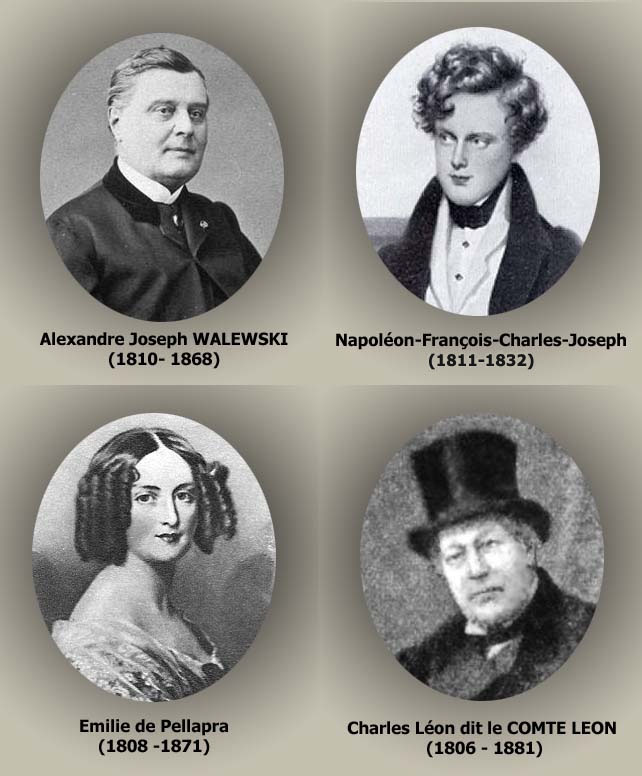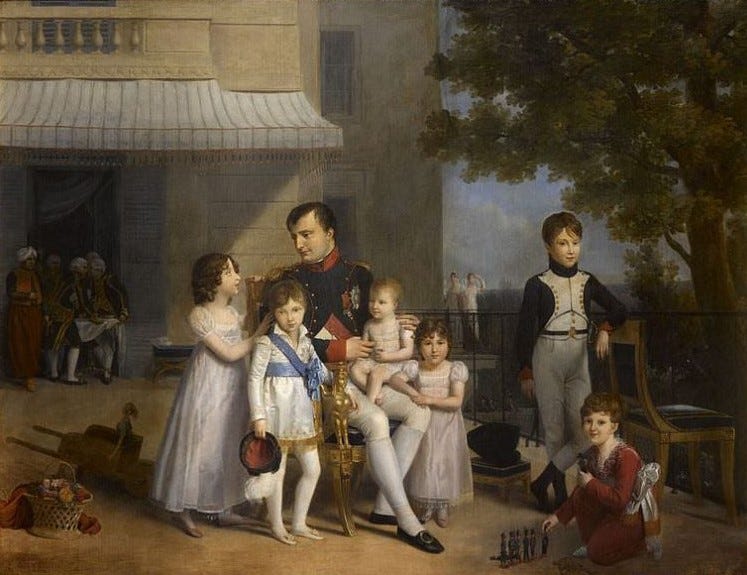When we talk about Napoleon's children, we're diving into a world of intrigue, power, and historical significance. The name Napoleon Bonaparte instantly conjures images of a military genius who reshaped Europe. But what about the kids he left behind? Who were they, and how did their lives unfold in the shadow of such a monumental figure? This is where the story gets interesting, my friend.
History often focuses on the battles and conquests of Napoleon, but there's so much more to explore when it comes to his family life. His children played crucial roles in the political landscape of the 19th century, and their stories deserve to be told. So, buckle up because we're about to take a deep dive into the lives of Napoleon's children and uncover some surprising facts.
From the famous to the forgotten, each child of Napoleon carries a unique tale. Some became powerful rulers, while others lived more obscure lives. Understanding their journeys gives us a clearer picture of how the Napoleonic era influenced the world. Now, let's get into the nitty-gritty details.
Table of Contents
- Napoleon's Biography
- Overview of Napoleon's Children
- Napoleon's Marriages and Their Impact
- Napoleon's Legitimate Children
- Illegitimate Offspring
- Historical Context and Legacy
- The Most Famous Child: Napoleon II
- Influence on European Politics
- Modern Perspective on Napoleon's Children
- Conclusion: Reflecting on the Legacy
Napoleon's Biography
Before we delve into the lives of Napoleon's children, let's take a quick look at the man himself. Born on August 15, 1769, on the island of Corsica, Napoleon Bonaparte rose from humble beginnings to become one of the most influential figures in history. He was a military prodigy who redefined warfare and left an indelible mark on Europe.
Napoleon's career was marked by a series of stunning victories and, eventually, tragic defeats. He was Emperor of the French from 1804 to 1815 and his reign was characterized by ambitious reforms, territorial expansion, and the Napoleonic Code, which remains a cornerstone of modern legal systems. But what about his personal life?
Well, his personal life was as complex as his political one. Napoleon had two marriages and several rumored affairs. These relationships resulted in both legitimate and illegitimate children, each with their own fascinating story to tell.
Brief Data on Napoleon
| Full Name | Napoleon Bonaparte |
|---|---|
| Birth Date | August 15, 1769 |
| Place of Birth | Ajaccio, Corsica |
| Death Date | May 5, 1821 |
| Title | Emperor of the French |
Overview of Napoleon's Children
So, here's the deal: Napoleon had a few kids, but not all of them were officially recognized. Some were born during his marriages, while others were rumored to be the result of his extramarital escapades. Let's break it down and see who's who in this family saga.
First up, we have Napoleon's legitimate children, which primarily include Napoleon II, also known as the King of Rome. Then there are the illegitimate ones, whose existence has been debated among historians. Each child had a different path in life, influenced by the political and social climate of their times.
Now, let's get into the specifics. We'll explore their lives, achievements, and the impact they had on history. But before we do that, it's important to understand the context of Napoleon's marriages, which played a significant role in shaping his family tree.
Napoleon's Marriages and Their Impact
Napoleon's marriages were not just about love; they were strategic moves to consolidate power and alliances. His first marriage was to Josephine de Beauharnais, a widow with two children from her previous marriage. This union didn't produce any children, but it was significant in establishing Napoleon's position in French society.
When it became clear that Josephine couldn't bear him an heir, Napoleon made the difficult decision to divorce her. He then married Marie Louise, the daughter of the Austrian Emperor, in 1810. This marriage resulted in the birth of his only legitimate son, Napoleon II. The union with Marie Louise was purely political, aimed at strengthening ties with Austria.
These marriages highlight the complexities of Napoleon's personal life and how it intertwined with his political ambitions. Each marriage had its own set of challenges and outcomes, influencing the lives of his children in various ways.
Marriage Dynamics
- Josephine de Beauharnais: Brought stability and social standing but no heirs.
- Marie Louise: Produced a legitimate heir, securing the dynasty's future.
Napoleon's Legitimate Children
Among Napoleon's children, his legitimate offspring hold a special place in history. The most notable is Napoleon II, also known as the King of Rome. Born on March 20, 1811, he was the product of Napoleon's marriage to Marie Louise. His birth was celebrated across Europe, as it promised the continuation of the Bonaparte dynasty.
Napoleon II's life, however, was marked by tragedy. He never ruled as king and died young at the age of 21 from tuberculosis. Despite his short life, he remains a symbol of the Napoleonic legacy. His story is one of unfulfilled potential and the weight of expectations placed on him by his illustrious father.
Other legitimate children, if any, remain shrouded in mystery. The historical records are sparse, leaving much to the imagination of historians and enthusiasts alike.
Key Facts about Napoleon II
- Born in 1811 to Napoleon and Marie Louise.
- Given the title "King of Rome" at birth.
- Died in 1832 from tuberculosis.
Illegitimate Offspring
Now, let's talk about the elephant in the room: Napoleon's rumored illegitimate children. Over the years, several individuals have claimed descent from the great emperor. While some of these claims have been substantiated, others remain speculative.
One of the most well-documented illegitimate children is Charles Léon, born to Eléonore Denuelle de la Plaigne. Charles Léon's existence was acknowledged by Napoleon, and he received financial support from the emperor. Another alleged child is Count Alexandre Joseph Colonna-Walewski, born to Maria Walewska, a Polish noblewoman.
These children often found themselves caught between the worlds of royalty and obscurity. Their lives were shaped by the shadow of their famous father, yet they struggled to carve out their own identities.
Notable Illegitimate Children
- Charles Léon: Acknowledged by Napoleon and provided for.
- Alexandre Joseph Colonna-Walewski: Born to Maria Walewska, became a French statesman.
Historical Context and Legacy
Understanding the historical context of Napoleon's children is crucial to appreciating their legacy. The Napoleonic era was a time of great upheaval and transformation in Europe. The children of Napoleon were born into a world where power dynamics were constantly shifting.
For Napoleon II and others, their lives were intertwined with the political machinations of the time. They were pawns in a larger game, used to secure alliances and maintain influence. Despite this, they managed to leave their mark on history, contributing to the rich tapestry of European heritage.
The legacy of Napoleon's children extends beyond their immediate lives. They serve as a reminder of the complexities of power, family, and legacy. Their stories continue to captivate historians and enthusiasts alike, offering insights into the human side of one of history's most iconic figures.
Legacy in Modern Times
- Descendants of Napoleon continue to exist today, preserving the family lineage.
- Their stories inspire books, documentaries, and even films.
The Most Famous Child: Napoleon II
Among all of Napoleon's children, Napoleon II stands out as the most famous. His life was a blend of privilege and hardship. Born into royalty, he was destined for greatness but never had the chance to fulfill his potential. His early death was a blow to the Bonaparte dynasty and left many questions unanswered.
Despite his short life, Napoleon II's impact was significant. He represented the hopes and dreams of a generation, embodying the ideals of the Napoleonic era. His story is one of tragedy and triumph, reminding us of the fragility of life and the importance of legacy.
Through his life, we gain a deeper understanding of the pressures faced by the children of powerful figures. They are often burdened with expectations and responsibilities that shape their destinies in profound ways.
Influence on European Politics
The children of Napoleon played crucial roles in European politics, even if indirectly. Their marriages and alliances helped to strengthen ties between nations and influence the course of history. For example, the marriage of Napoleon II to the Austrian Archduchess Marie Louise was a strategic move to secure peace between France and Austria.
Beyond politics, the children of Napoleon contributed to the cultural and social fabric of Europe. Their lives were a testament to the interconnectedness of nations and the shared history that binds them. Through their stories, we see the broader picture of how families and individuals can shape the destiny of nations.
Modern Perspective on Napoleon's Children
In today's world, the story of Napoleon's children continues to resonate. They are studied and analyzed by historians, offering insights into the human condition and the complexities of power. Their lives serve as a reminder of the enduring legacy of one of history's most fascinating figures.
From a modern perspective, we can appreciate the challenges faced by Napoleon's children and the resilience they displayed in the face of adversity. Their stories inspire us to reflect on our own lives and the legacies we wish to leave behind.
Conclusion: Reflecting on the Legacy
As we wrap up our journey through the lives of Napoleon's children, it's clear that their stories are as captivating as the man himself. From the tragic tale of Napoleon II to the intriguing lives of his illegitimate offspring, each child adds a unique dimension to the Napoleonic legacy.
This article has aimed to provide a comprehensive overview of Napoleon's children, their lives, and their impact on history. We've explored their personal journeys, the political context of their times, and the lasting legacy they left behind. If you found this piece enlightening, we encourage you to share it with others and continue exploring the rich history of the Napoleonic era.
So, what's next? Dive deeper into the world of Napoleon and his family. There's always more to discover, and every story has the potential to inspire. Let's keep the conversation going and honor the memory of those who shaped our world.


